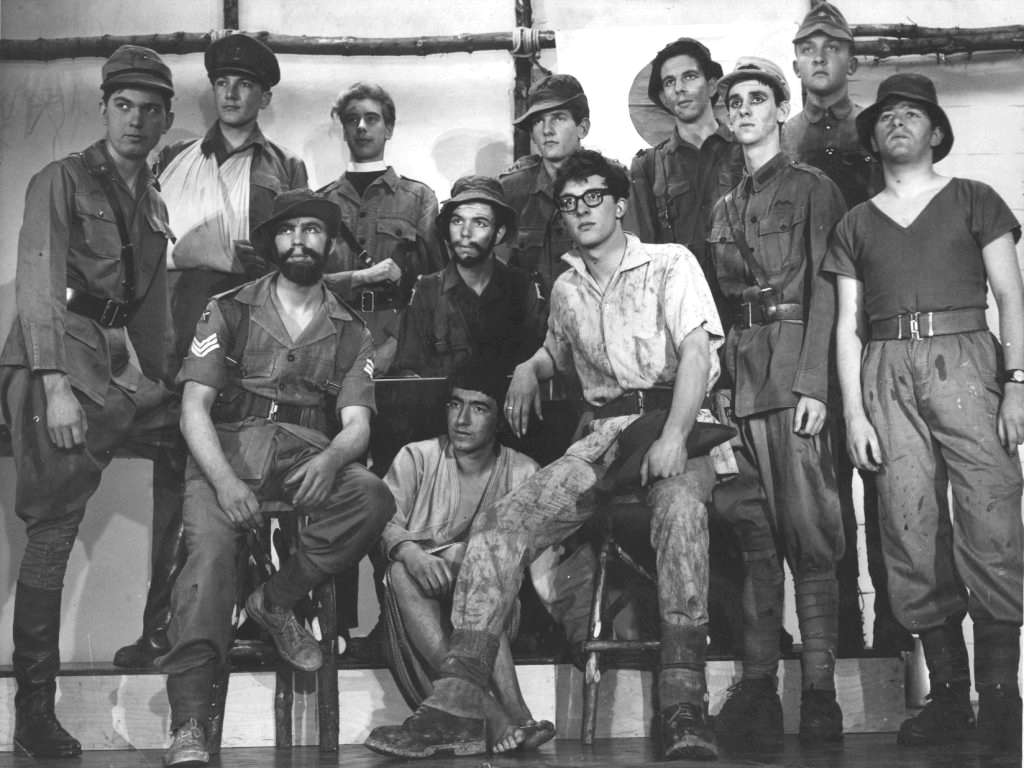From the 1962 School Magazine "The Review"DRAMA SOCIETY Thanks to Jim Hancock for this photo. This year the Drama Society embarked upon its most ambitious project so far - the first three-act play for public performance in the history of the School. Plays with all-male casts are few in number, and the choice of title proved to be difficult. Eventually, however, an anti-war play with a military background was chosen - Peter Newman's "Yesterday's Enemy". Set in the Burmese jungle, the play tells the story of a group of British soldiers during the initial Japanese attack on Burma in 1912. The men are led by Capt. Alan Langdon, a man who has great personal courage and authority, but is quite ruthless when the safety of his men is at stake. The group's arrival in a small Burmese villa-( and subsequent capture form the basis of the story. Presumably the fact that the Society was breaking new ground accounted for the reluctance of volunteers for acting; only eleven boys appeared at the audition for the twelve parts in the play. As a result, all were cast, and a "twelfth man" found for the smallest part that of the Japanese officer who is killed on page one . The great success of the play is due to the fact that all who helped did so with such efficiency. Praise must go to the cast for developing their acting, far beyond the mere "speaking of lines". Alan Tranter in the part of Capt. Langdon had a difficult task but acquitted himself very well; Vincent Harrop as the humane medical officer, Peter Howe as the loyal sergeant, Wilfred Deakin as the bewildered Paul Hastings, David Waters as the Padre, Barrie Capper as the Cockney "light relief ", Wilson, and John Micklewright in the small but important part of the Brigadier all performed with a confidence that belied their years. As Major Yamasaki, Langdon's opposite number in the Japanese forces, Robert Brown showed a remarkable stage presence and was a very commanding figure, while in the smaller Japanese parts, Roy Morley and Trevor Barsted were most convincing. As the civilians, Rex Leverett brought out the treachery of the Burmese effectively, and Philip Thompson gave Max a touch of bitter irony as the man caught up in the toils of war against his will. The excellent set was designed and painted under the supervision of Mr. Light, who was also responsible for the highly inventive advance publicity; Mr. Ballham ensured the smooth-running of the front-of-house arrangements ; Mr. Thomas was in charge of finance and ticket sales, which brought about such a satisfying result ; Mr. George controlled the backstage activities with commendable aplomb; Mr. Bromfield gallantly developed order out of a chaotic assembly of properties ; Mr. Allen acted as over-all liaison officer in his capacity as Stage Director; Mr. Howell assisted with sound, and Mr. Fox produced. The one unhappy note was the absence of Mr. Potts, who was unable to see the finished presentation because of illness, but his good wishes from hospital were very much appreciated. D. J. Waters. An Appreciation "Yesterday's Enemy" was the first full length play ever produced in this school. Last year Mr. Allen produced a one act play which "broke the ice" but even so, we approached this year's longer production with some fear and trepidation. Its amazing success was due to the genius of Mr. Fox in choosing the play and then persuading the boys that they could act it. He turned a very raw collection of boys into a talented company of actors and in doing so, he set a standard which is going to be very difficult to maintain in future productions. W. P. |